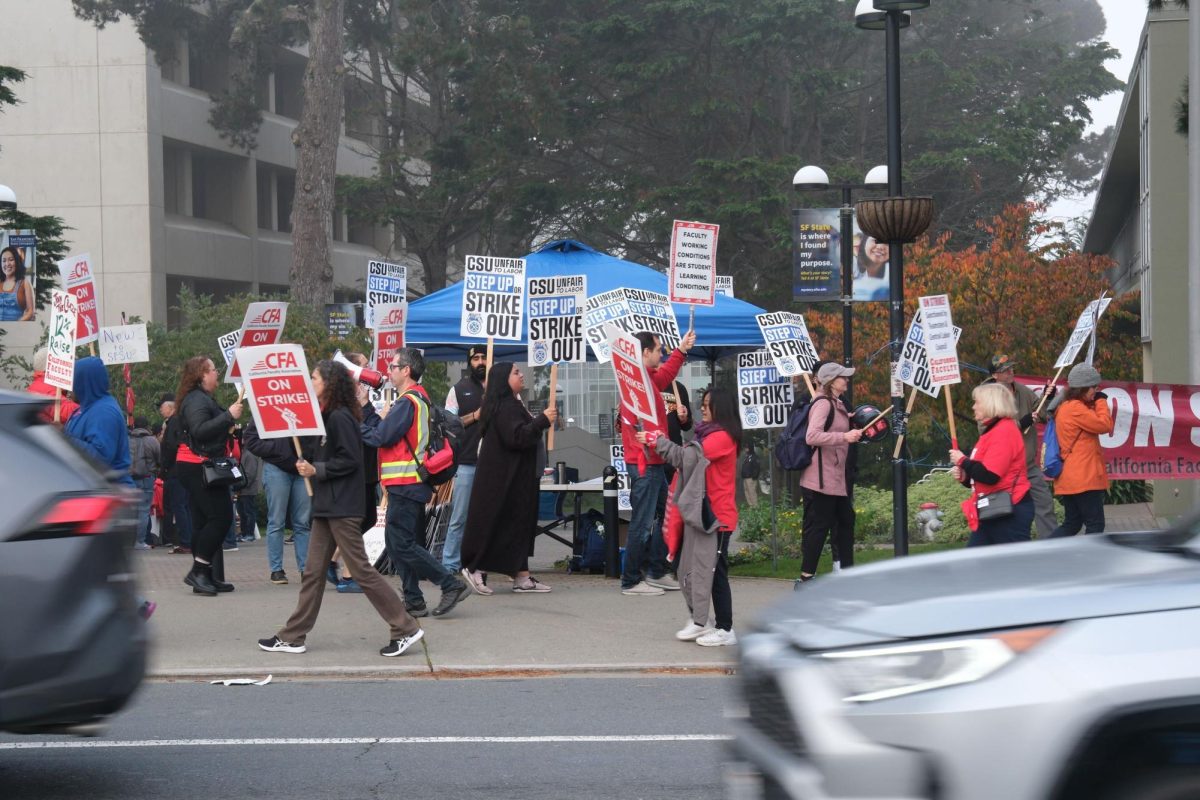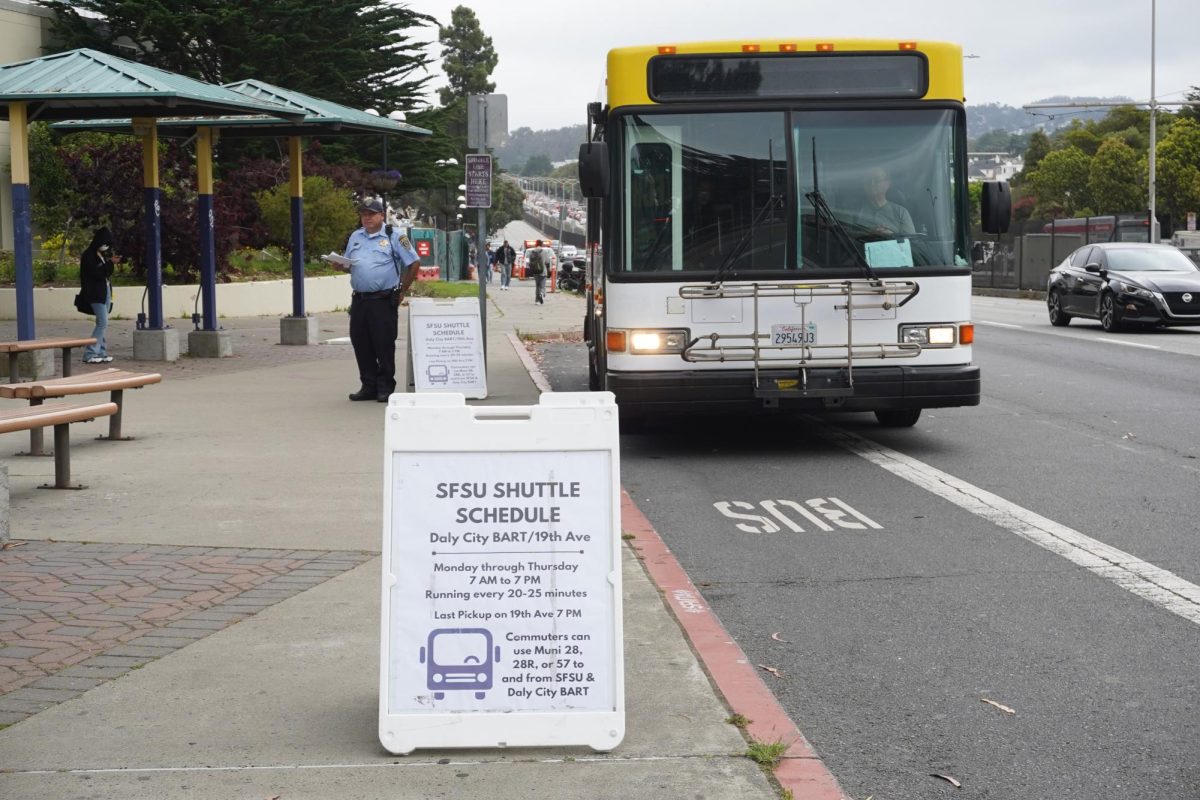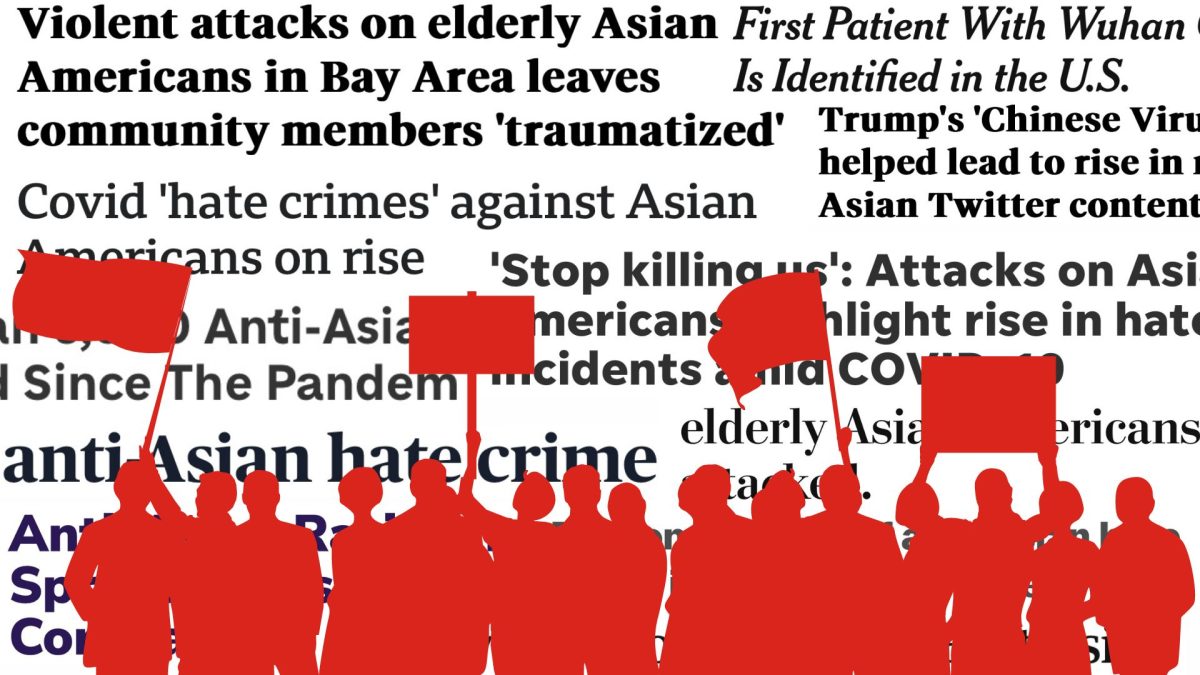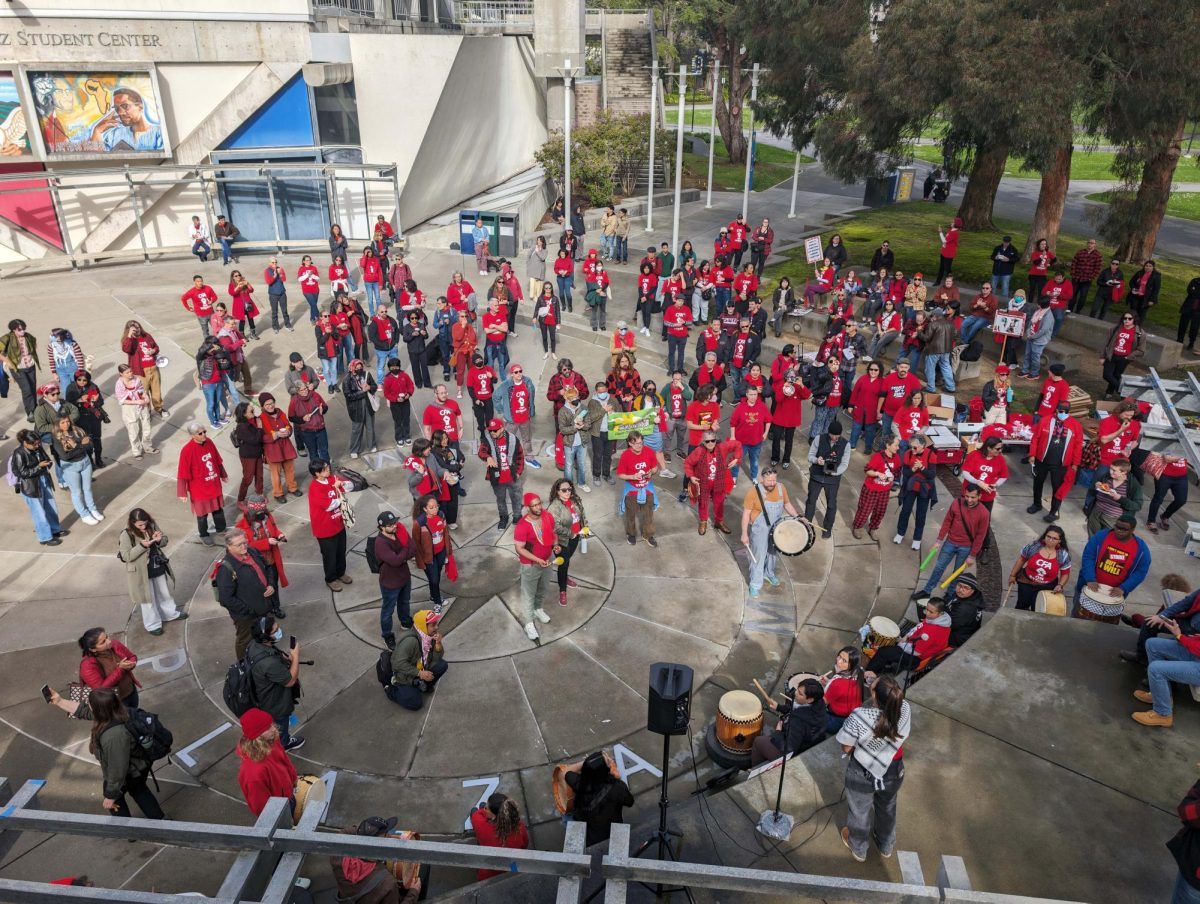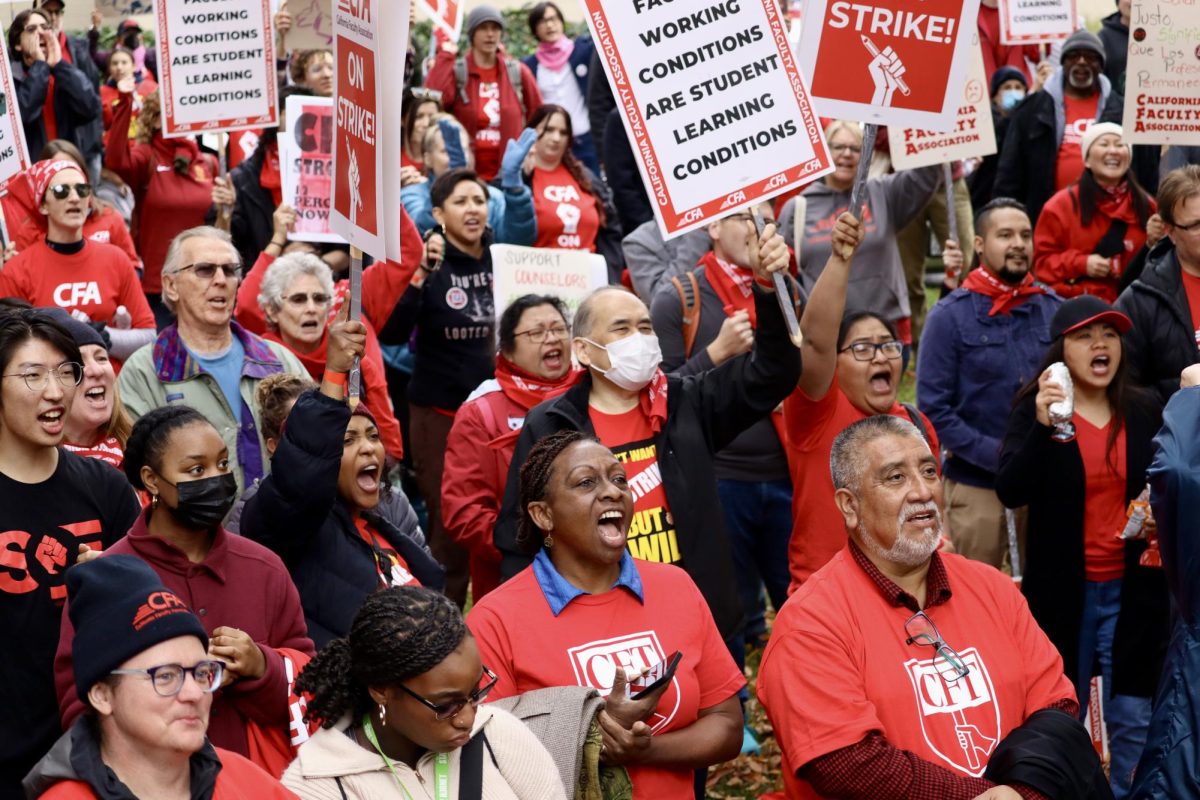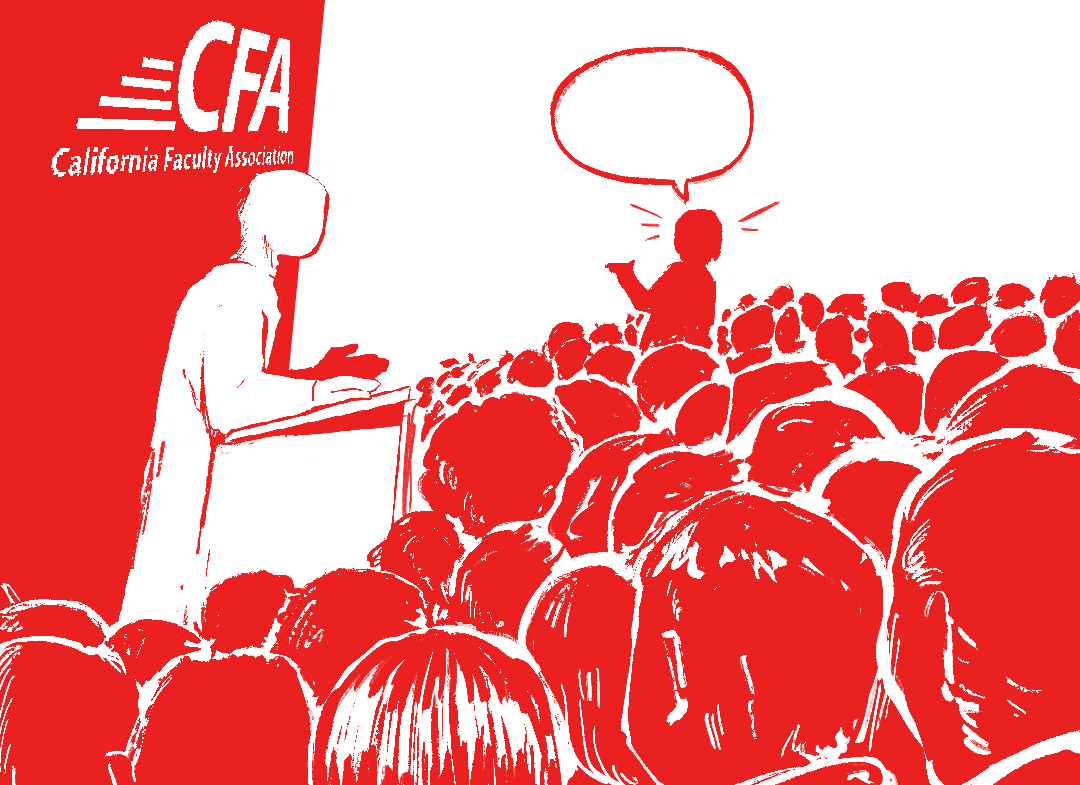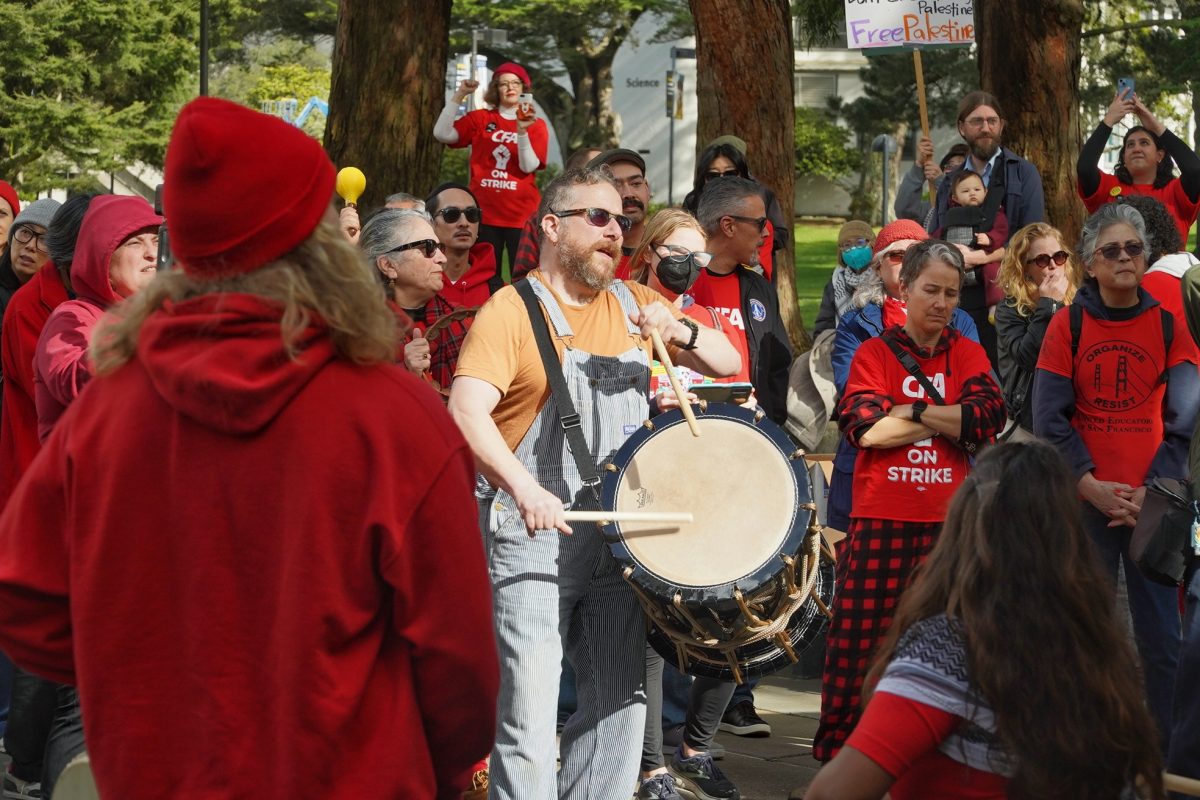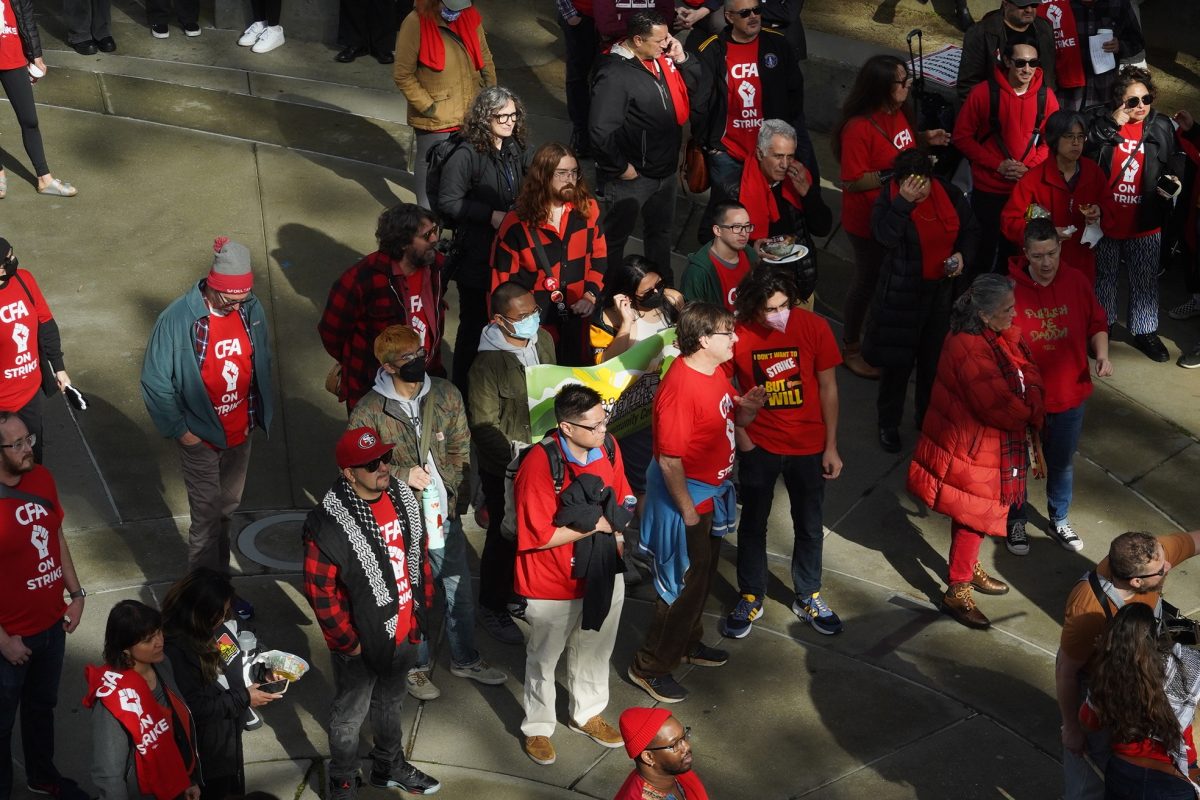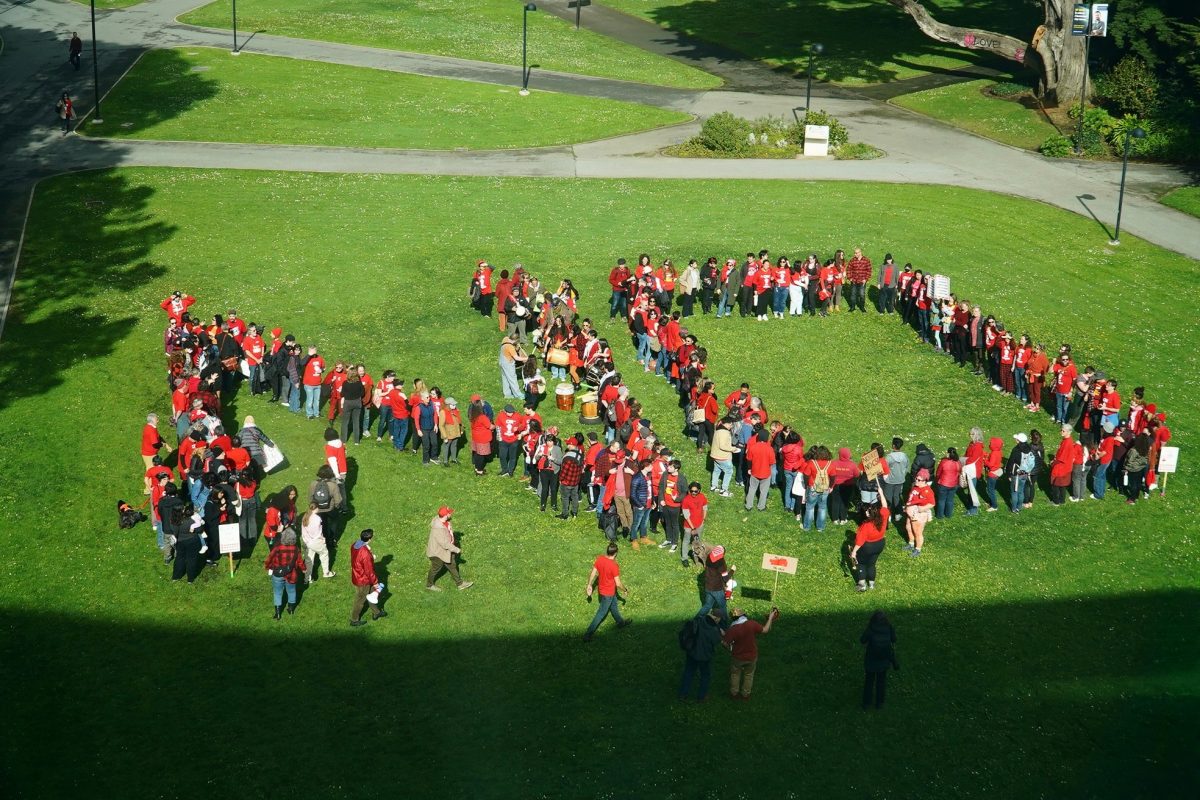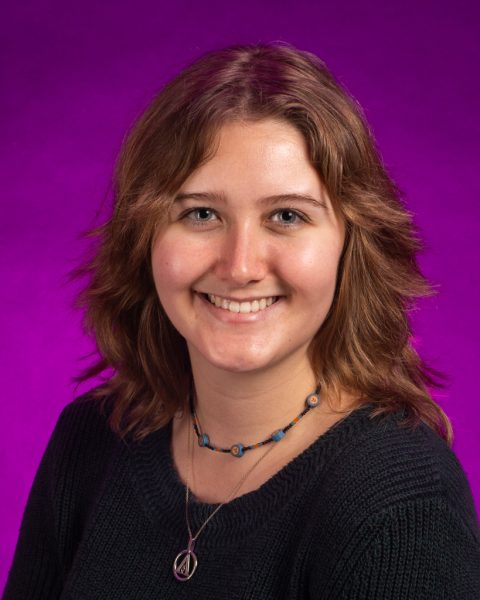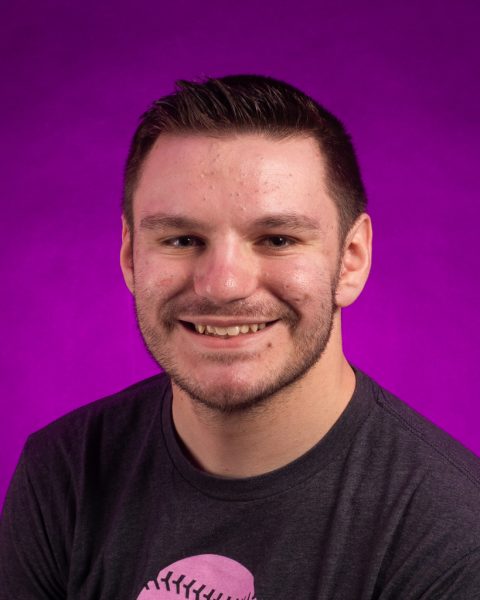Welcome to Gator Talk, the Xpress podcast that brings city perspectives to local, regional and national news. In today’s podcast episode, staff reporter Sophia Osborn sits down with California Faculty Association SFSU chapter president Brad Erickson to debut a new series surrounding labor on campus.
Intro
Sophia: Welcome back to Gator Talk. My name is Sophia Osborn and I’m a writer on the staff. I’ll be your host on this episode of Gator Talk.
Preview of the Show
Sophia: Today, we’ll be debuting a new series surrounding labor discussions happening around the San Francisco State University campus. On this day, we’ll be joined by Brad Erickson, the SFSU, chapter president for the California Faculty Association, and full-time lecturer in the School of Liberal Studies. We discussed the possibility of a faculty strike and what students could do to prepare. All of this and more coming up next on Gator Talk. Let’s get started.
Interview
Sophia: Hi there, Brad. How are you today?
Brad: I’m good, thank you. How are you?
Sophia: I’m doing well. Thank you so much for coming on the show. We’re going to talk about
some of the CFA things that have been happening on campus and just sort of an update on where we are because I know that there is a presentation –– not a presentation –– but a vote whether or not to go on strike on October 21. Right?
Brad: Yeah. So I’ll kind of update you on the timeline. We started negotiations with management this summer. And after a few meetings where it seemed that they weren’t going to budge, we declared impasse. And so we’ve been in a period of first, mediation and now fact finding where independent third party folks get in the mix –– evaluate where we are and make a determination about the claims that management’s making, that they can’t afford to meet our proposals. And if they find in our favor, that frees us to declare a strike. At the same time, we’re fighting two battles because on our campus –– which is one of the campuses with
declining enrollment, certainly not as intensive, some like Sonoma, two and a half times more in Humboldt, more than three times more a decline. But the announced layoffs of lecturer faculty for the spring semester are the largest we’ve heard of.
Our numbers look like a 44% decrease from two years ago, whereas we show enrollment down 11 1 ⁄ 2 %, and lecturer faculty already down 13%, suggesting that these cuts aren’t about enrollment. And if they are, they’re way disproportional to it. And the timing –– I mean, management has known for two years that we would be in negotiations as well. And so the timing of announcing these wildly disproportionate cuts, which are really disconnected to the reality of enrollment on the campus, really appears to be kind of intended to discourage faculty from organizing, particularly lecturer faculty who might feel like I’m not gonna have a job in the spring: ‘Why should I be invested in organizing for good contract?’
This is really interference in our legally protected human rights. That said, our campus really stood up to these strong arm tactics. Last week, I know you were there, we had a raucous rally in the quad. We had a well-attended town hall meeting. Well, first, we were able to share our information, our budget analysis, because it’s been very one-sided.
The administration has been kind of hammering the Academic Senate and kind of wherever they can with their version of the budget. And they present this budget as if it’s the laws of physics as opposed to something that they invented. At the statewide, they are saving ––putting a billion dollars a year roughly into investments rather than classroom expenses. And they won’t show us the books on what they’re doing with it. They say they can’t touch it, but they won’t.
They won’t share for that reason, the union has filed an unfair practice charge because of this is a violation, because management normally has a better sense of its own finances than labor. So it has an unfair advantage. That’s why labor law guarantees unions the right to have access to these financial records. Management has refused to give these and on the campus, we’ve also had the same problem. We’re trying to assess whether or not these cuts to lecturer faculty are proportionate. But management has failed to share the numbers with us.
To finally answer your question: the week of October 21 to October 27, the statewide union will be having a vote strike authorization vote. This is prior to fact finding being done, which may happen as soon as the end of the month. It will prepare us because it will then be ready. If faculty here and the other campuses vote, the majority vote in favor of holding a strike if management doesn’t accept our proposals, that means we would then legally be able to strike immediately or call a strike at any time, after the end of fact finding.
Sophia: Kind of going back on to what you said, I’m looking at your budget for Teaching and Learning counteracting management fiscal crisis narrative from the CFA website. It’s talking about how there is an estimated over $12 billion in the reserves. So I just kind of wanted to know like, where are these numbers necessarily coming from? Because we’ve done a little bit
of research on the side and like some of the things that are linked or showing like an $8 billion, or like the $1.3 billion something around there.
Brad: Yeah, so if you go to that same website that we cite, which is the state of California of CSU. I believe it’s called transparent. One piece shows reserves and one part shows investments. The reserves are, I believe, $3.7 billion, and the investments are $8.5 billion. I’m not looking at it right now, like you are. But it’s about that. And so between these two things, we get $12.3 billion, if you add them together and that’s just what they’re saying they have this summer when we brought that up in negotiations.
They didn’t contest these numbers. They just said, ‘Well, yeah, we have it, but we can’t spend it because it’s earmarked,’ or something like that. The problem is, all this money comes from either tuition or the state –– neither of which is earmarked. So the earmarks are whatever they’re saying is earmark. They’re saying, ‘Oh, we can’t spend it because we’re doing this.’ And we accept the idea that some things might be OK, ‘this building is falling apart, we need to fix it to make it safe,’
We understand and accept that some things probably really can’t be spent. If that’s really true of all of it, why won’t they release the documents that would show that? Why are they afraid of us seeing the truth? And why are they afraid of letting us have a say for that matter, instead of just hearing endless management versions of this? Why don’t we have equal time? Why can’t
the union have equal time? Why can’t students have equal time? Instead of having only a few minutes for questions and cutting it off, why not having a real campus wide debate where we –– where everyone –– gets to participate has plenty of time for questions, answers and comments.
Sophia: And in the budget meetings specifically –– I know, there’s one coming up this week, I believe. And are you talking about when they cut off the question sections for that part? Or do you want something bigger and maybe a separate event?
Brad: Well, I think the principle of equal time should be applied across the board. Whenever the Budget Committee presents anything, their time should be limited. There should be equal time for other perspectives. The union, in specific, but if anyone else wants to tell a different story of the numbers, that should also create space for this. This is our campus. This is our shared governance. They don’t get to cut off debate in that way. In addition to just any time they’re presenting, we want equal time. We specifically would like the Academic Senate to host an all faculty meeting that students would also be invited to in which we really have equal time management and the union, and at least an hour for moderated questions, answers and comments.
Sophia: And so did you guys kind of do that with your town hall meeting that followed the rally last week?
Brad: Yeah, the town hall meeting was our attempt to start creating some equal space for faculty and the rest of the campus community to hear an alternative explanation of the budget. And again, we don’t have as much information as management because they won’t share it with us. As you can see, there is a fair amount of information there. They cite certain questions. So even using their own version of what’s happening to enrollment, we can show that the cuts to lecturer faculty are wildly disproportionate, and really like punitive –– really playing hardball. This is a declaration of war when management something like this and so that’s why we have to step up. That’s why people might think, ‘Oh, you’re being noisy. You’re being militant.’ But you can’t attack people and expect them not to defend themselves.
Sophia: When I was covering that rally last week, I heard a lot of numbers –– it was something around 300 lecturer faculty are going to be laid off next semester during the spring 2024 year. And 650 classes are going to be cut from the scheduled planning.
Brad: Yeah, so late August, the budget committee presented a plan that showed that they will be cutting 131 full-time equivalent lecturer faculty. Now, only 6% of lecturer faculty on this campus are full-time, which is one of the worst in CSU. That and the average, as of last year, the average time base was .37, just under 40%. If you take that percentage, that would show about 327 people losing their jobs. If it translates neatly in that way, which it won’t, it will be something different. But if you look at five courses times 131 full-time equivalent people, that’s 655 courses canceled. That part is very clear now. Oh, I don’t think I told you the big news, did I?
Sophia: No, what’s your big news?
Brad: OK. On Tuesday, the provost came into the academic senate executive committee.
Sophia: This Tuesday?
Brad: This Tuesday –– the day after our report came out the week after our rally and our town hall. And she apologized that the extent of the cuts was too much. The reduction was happening too aggressively. She apologized and announced that they would be restoring $1.5 million to retain more lecturer faculty at San Francisco State. This is a partial win. I mean, we still don’t want any cuts and we want to protect all those jobs. But make no mistake, the only reason this happened was because of union organizing and student organizing and all the noise we’re making on campus.
Sophia: Do you think this is because of the rally that happened last week and the town hall that followed that?
Brad: It’s all of these things. We know management doesn’t like rallies on campus, especially when potential students might be visiting. They don’t like negative media, which we’ve also been generating media. Also, thanks to you, we’ve been generating media. And also, we’ve been having allies –– in labor organizations and elected officials –– contact the president and the provost and ask them to roll back these cuts. If it’s just a single person asking them something like this, there’s no particular pressure to do it. But when you bring public pressure you do it publicly, you share it, you share it with their bosses, the legislators who are their bosses they start to take notice. I think it’s a combination of all of these strategies and tactics. Overall, the rank and file energy on the campus is the thing that’s driving it all.
Sophia: How likely do you think the strike is to happen now after this big win?
Brad: This win is specific to our campus, and it really just gets us close to the status quo, right? It doesn’t solve the problems that we had before these cuts happened, which were that continued faculty pay is extremely low. It’s lower than public school teachers. It’s lower than any other contingent faculty in any other state system –– community colleges, the UCs, etc. We still need to bring up the low pay. We still had a situation where we lost a lot of money relative to inflation.
A 12% raise across the board ––that we’re asking for –– just brings us even with inflation. It’s not a real race, I mean, less than 1% raise. Unless management comes to their senses and says, ‘Yes, we’re going to meet these demands, we understand you can’t win when double digits increase your childcare costs and your grocery costs and your rent costs. We can’t just can’t expect you to accept a 5% increase that leaves you underwater.’
If they come to their senses, there won’t be a strike. But at this point, we don’t see any indication that they’re going to meet our proposals. They just got tentative agreements with the other campus unions, which have some good and bad aspects to them. They’ll probably try to get us to accept something similar to that. But there’s no appetite for it. We had open bargaining for the first time. We were much more militant. Our members realize that last time we accepted a weak contract that left us vulnerable, that left us with a loss.
I think faculty across the system are pretty determined. If it means going to strike, we’re ready.
Last week, I asked faculty who were in the town hall if they’d strike for a day. They said yes. Two days? Yes. Three days? Yes. Four days? Yes. A week? Yes. I didn’t keep going, but that’s an indication if we shut down the campus for a week, that’s, that’s power. If we have to do it longer, that’s power. I think a strike is likely, and we need to be ready.
Sophia: So how would you recommend that students prepare for this kind of devastation to their academic schooling? And just their schedules in general? What about the commuters that come onto campus? I know professors and lecturers are also commuters. What would happen in that regard?
Brad: Well, the main thing is to be in communication with your instructors. Ask them what’s going on. Of course, you can learn from us –– the union directly. If you support your professors, let them know. Let them know you’re standing with them. Let them know if it’s possible for you –– if and when we go on strike –– that you will be on the picket line with us. Some people, for whatever reason, maybe can’t be there on the picket line. If that’s the case, just stay home and also don’t cross the digital picket line because having a class via Zoom is crossing the picket line.
Logging into Canvas is crossing a picket line. Any work that’s done by faculty responding to student emails during a strike is crossing the picket line. We’re just asking people to respect the picket line. Either come join it or stay away. Either way, it’s important that we actually shut down the campus and cause disruption. I think the more total that disruption is, the less likely
it is to last long. In previous cases, management acceded to our requests after one-day strikes, or they actually came a day or two before the strike was to begin and say, ‘Okay, we accept or we have a better offer.’
Sophia: Do you guys have to announce the day that you will be going on strike?
Brad: The decisions about what kind of strike, how long and what campuses –– this is really coordinated at the statewide level. I and five other faculty members from the union here are going down to Long Beach on Friday. We’ll be for the weekend. The week before we have the strike authorization vote. That will be another chance for us to talk about what we think we might do. It could be rolling strikes, where you know San Francisco State goes on strike for a few days or a week, and then another campus goes for a few days. It could be all at once, it could be –– we just focus on a few campuses. Maybe one in Northern California, one in
Southern California. That’s going to be a collective democratic decision of the union. But then at the last minute, it will be the organizing committee making a strategic announcement. And that’s when we’ll all know, so we can’t know too much in advance.
Sophia: Just to make it clear, crossing the picket line for a student’s perspective would look like logging on Canvas, doing assigned readings from a professor, emailing a professor during the strike time?
Brad: It’s also crossing a picket line if the instructor says, ‘Oh, well, I won’t be doing any work, but then you can make up that work later.’ Because if they’re making up the work later, they’re kind of crossing the temporal picket line they’re going back to do work that they didn’t do during the strike. I would suggest to any faculty and students that any work that is assigned at a time that the strike is happening, be just removed from the grade calculation –– just just cancel it. I know it’s kind of hard to give up like, ‘Oh, this was an important thing to learn.’ It’s true, but learning is going to be much better in the future if we really create good teaching conditions, working conditions for the instructors.
If we let this bad deal come through, offering this 5% that leaves us underwater, not raising the bottom pay of lecturer faculty, not meeting our proposals for safe and inclusive campuses. This is a worse situation for all of us –– students and instructors, and staff as well. I think it’s really important that we stick together, which is why the faculty union is completely opposed to the tuition hikes. We’re standing with students. We don’t see this as unnecessary. For the same reason, we think that it’s wrong that they’re claiming they can’t pay us a living wage ––that they think they need to raise tuition. If that’s true, share the numbers with us. Share the reports we’ve asked for. We’re waiting over two months and they haven’t shared this.
Sophia: I did do a Q&A with President Lynn Mahoney and she did say that she was in favor of the tuition hike, which passed 6% annually for the next five years –– which is something like $375 a year. We can fact check those numbers. But she said that around 75% of that tuition hike wouldn’t be going to lecturer and faculty pay. So what do you say in regards to that?
Brad: I think this is a subtle way of dividing students and faculty –– telling students ‘well, we’re raising tuition because the greedy professors want more money,’ right? The question for students: Are you going to accept that? The other thing for us, when they say, ‘Oh, such and such a percent will be used to pay faculty.’ Well, we’ve never seen such guarantees in the past. Intuition just goes into a big pot. Can they do what they want with it? They’ve got a Chancellor’s office that costs almost $200 million a year, which is more than the entire budgets of seven CSU campuses. What the hell even happens in this ghost campus where no student ever graduates? We don’t know. That’s a lot of money and it’s unclear what they actually do. If the chance was worth anything, it should be fighting for resources for this system.
Sophia: We talked a little bit about the virtual picket line. Where is this real picket line going to be taking place? Is this going to be on campus? Is this going to be down in Long Beach? Where are we standing up?
Brad: Well, assuming we strike at this campus, which again, I think likely not guaranteed, we would probably be thinking about being visible. Maybe we’d be out on 19th Avenue. We’d also think about stopping people from entering the campus to work. We might be down by the parking lot as well. I mean, it’s open, the campus is open lots of different places. In practical sense, it would take ––I don’t know how many people it would take to really block it off more than we even are so that we’re not looking to do that. But we’re really looking to shut down the campus by just faculty deciding not to go to work until these demands were met.
Sophia: We talked a little bit about the financial side of what you guys are potentially striking for. What about the working conditions and the other things you guys are working for?
Brad: Yeah, the contract has 41 articles. We’re only bargaining for pay, that I’ve already talked about. Workload is another. One really important piece is counselors. Counselors are faculty members, and they’re very overworked. On this campus, any students who’s trying to get appointments, trying to get a counselor has probably experienced not being able to do that as easily as they would need.
We believe that the international standards or the student to counselor ratio should be in the contract. Instead, we have one in the CSU –– we have one counselor for every 1814 students, but one manager for every 100 students. This, we think, is a case of the failure to prioritize students and classroom education, and a huge growth of a management class, which hasn’t really justified itself. We don’t know what the benefit –– we know we need some managers, but we did find in the past with a much fewer number of managers, and with them taking a much, much smaller chunk of the overall budget, what management and the CSU haven’t demonstrated, is why the growth and the scale of management actually benefit students who benefits the system or benefits the state of California. They haven’t demonstrated that and the state auditor has has criticized them for that very thing. Like you’ve grown this much. And you haven’t shown that it was needed. So that’s another thing if you’re gonna talk about cuts, start there.
Sophia: Anything else you’d like to say?
Brad: Just I really appreciate the work that you do here. Just thanks to the Xpress and all the students who work on it. Really valuable service. You provide voices to be heard for democracy to happen on the campus –– transparency. I just really appreciate you.
Sophia: Cool. Well, Brad, thank you so much for coming on. We really appreciate you.
Outro
Sophia: Thank you for listening to Gator Talk. We hope you enjoyed our interview with Brad Erickson. We’ll be back with more open discussion with other union members soon.
Follow us on social media @GGXNews news and keep up with all of our stories on GoldenGateXpress.com





